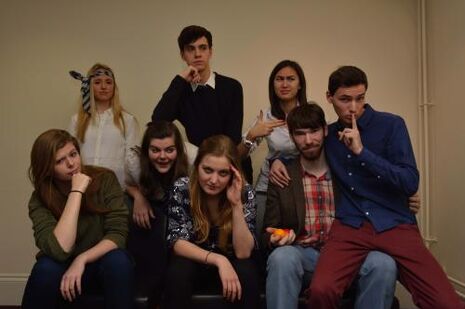Review: The History Boys
Our reviewer enjoys a gender-bending rendition of a popular play

Alan Bennet’s The History Boys will be a favourite of many Cambridge students, not only because of its exploration of the Oxbridge admissions process, but because of the success of the 2006 film.
It’s also a brilliantly written play: deeply poignant explorations of issues from pedophilia to the Holocaust intersect hilarious and touching scenes from the classroom. I went along to the Pembroke Players’ production determined not to constantly compare it with the film and, whilst this inevitably proved difficult, there’s enough innovation in this re-working to make it worth watching.
That the script was written for the stage rather than film was obvious: flashbacks and addresses to the audience seemed far more natural than they would onscreen. The raucous environment of the classroom managed to comfortably coexist with the quieter staffroom through use of staging; lighting and ‘80s classics between scenes also enhanced the ambience. Other than during the practice interview scene, staging did work extremely well, particularly given the limited capacity of Pembroke New Cellars.
Character is intrinsic to The History Boys as, where it isn’t character comedy, it’s a poignant exploration of emotion, and tests the boundaries between the acceptable and the unthinkable. In light of this, I felt that some of the play’s most brilliant lines were neglected by delivery, and Hector’s portrayal lacked the depth his complexity demands. Quentin Langley-Coleman as Irwin was also neither anxiously enthusiastic enough to be likeable or austere and critical enough to elicit an appropriate reaction; instead he hovered somewhere in-between.
The other members of staff- Holly Whitworth as Lintott and Lottie Tucker as the headmaster- gave more convincing performances, despite taking opposite approaches to their characters. Tucker’s portrayal of the headmaster was very similar to the film equivalent, and was thus similarly hilarious, whilst Whitworth’s Lintott was far less feisty than I’d imagined her. Instead, her interactions with the other, exclusively male, members of staff remained passive and ironical until her frustration was vented against the headmaster and the ‘various and continuing incapabilities of men’ throughout history.
Casting the roles gender blind paid off: Jasmin Rees brought the energy to her portrayal of Timms which some other characters lacked, whilst Claire Takami-Silijedahl contributed sharp and naturalistic delivery as Akthar. The interactions between the boys could have been stronger, which would perhaps have been easier if we didn’t only see them sitting at their desks. Their interludes of music and sketches were highly entertaining, however, and synthesised brilliantly into the wider structure.
I found Simon West far too sincere in his portrayal of Dakin, whose lines demand a certain joviality and a laid-back, devil-may-care attitude. Taking him more seriously did help to call out how sexist some of his lines are, however, and forced us to fully consider the implications of his inappropriate seductions of Irwin and the headmaster’s secretary. The real revelation of the production was Stanley Thomas, whose portrayal of Posner was both hilarious and compelling: he was extremely funny, particularly during the iconic Brief Encounters scene, and balanced this with touching melancholy and self-discovery. Both of these qualities were perhaps best encapsulated in the line ‘I'm a Jew, I'm small; I'm homosexual, and I live in Sheffield. I'm f*cked.’
All in all, The History Boys is certainly worth watching and will only increase in momentum as shows continue. Some opening-night nerves were perhaps the cause of shakier scenes, and stand-out performances carried it through. It’s a fantastic concept and was made a lot of fun by the Pembroke Players, whose casting of a number of freshers in significant roles was also encouraging to see. I would certainly recommend this show as one which blends tragedy, comedy and (of course) history, thus making it perhaps uniquely universal.
 News / Uni Scout and Guide Club affirms trans inclusion 12 December 2025
News / Uni Scout and Guide Club affirms trans inclusion 12 December 2025 News / Cambridge Vet School gets lifeline year to stay accredited28 November 2025
News / Cambridge Vet School gets lifeline year to stay accredited28 November 2025 News / Pembroke to convert listed office building into accom9 December 2025
News / Pembroke to convert listed office building into accom9 December 2025 Features / Searching for community in queer Cambridge10 December 2025
Features / Searching for community in queer Cambridge10 December 2025 News / Uni redundancy consultation ‘falls short of legal duties’, unions say6 December 2025
News / Uni redundancy consultation ‘falls short of legal duties’, unions say6 December 2025









